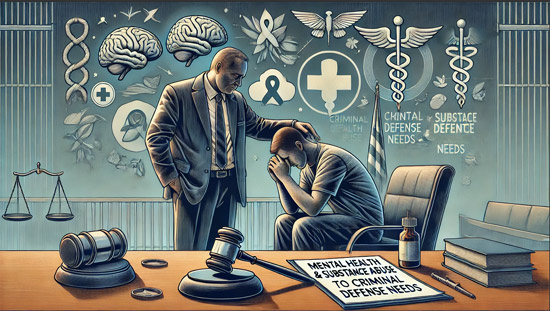In today’s legal landscape, it’s becoming increasingly clear that mental health and substance abuse are deeply intertwined with the criminal justice system. Far too often, individuals facing criminal charges are struggling with underlying mental health challenges, addiction, or both. For Elizabeth Tuomey, a Northern Virginia attorney with a strong focus on defending clients with these vulnerabilities, addressing the root causes of criminal behavior is not just a professional responsibility but a moral imperative.
This blog explores the close relationship between mental health, substance abuse, and criminal defense and highlights why Elizabeth Tuomey has made it her mission to advocate for those who need help, not just punishment.
Mental Health and Substance Abuse: The Overlooked Factors in Crime
The intersection of mental health and substance abuse with criminal behavior is not a new phenomenon, but it’s one that the justice system has historically struggled to address effectively. According to the National Institute of Mental Health (NIMH) and the Substance Abuse and Mental Health Services Administration (SAMHSA), individuals with untreated mental health conditions or substance use disorders are disproportionately represented in jails and prisons.
Here’s why this connection is significant:
- Crisis-Driven Decisions: Mental health disorders like anxiety, depression, PTSD, or bipolar disorder can impair decision-making and emotional regulation. This often leads to actions that result in legal consequences.
- Self-Medication Through Substances: Many individuals with untreated mental health conditions turn to drugs or alcohol to cope, which can lead to addiction and drug-related criminal charges.
- Recurring Cycles of Crime: Without appropriate treatment, individuals with co-occurring disorders (mental health issues and substance abuse) often cycle in and out of the justice system.
These challenges highlight the need for a legal approach that does more than simply process cases. It calls for compassionate advocacy aimed at finding sustainable solutions.
Why Criminal Defense Needs to Address the Underlying Issues
For attorneys like Elizabeth Tuomey, the traditional “punishment-first” approach often fails to serve justice, particularly when the accused is battling mental illness or addiction. Her focus on these issues stems from a belief that addressing the underlying causes of criminal behavior leads to better outcomes—for the client and society as a whole.
- Preventing Recidivism: By focusing on treatment rather than incarceration, it’s possible to break the cycle of reoffending. Clients who receive mental health care or substance abuse treatment are far less likely to commit crimes in the future.
- Humanizing the Accused: In a court of law, it’s easy to reduce individuals to their charges. Highlighting a client’s struggles with mental health or addiction encourages judges, prosecutors, and juries to see the full picture and consider alternative sentences.
- Advocating for Rehabilitation: Many states, including Virginia, offer specialized programs such as drug courts and mental health courts. These programs are designed to provide treatment instead of punishment. An attorney who understands these systems can advocate effectively for clients to access these life-changing resources.
Elizabeth Tuomey’s Approach to Criminal Defense in Northern Virginia
Elizabeth Tuomey has built her Northern Virginia law practice around the belief that every client deserves a defense rooted in understanding and advocacy. She recognizes that clients facing criminal charges often feel ashamed or hopeless, especially when mental health or addiction issues play a role. Tuomey’s approach combines legal expertise with a commitment to addressing these challenges head-on.
Why She Focuses on Mental Health and Substance Abuse
- A Holistic View of Justice: Tuomey believes that the criminal justice system must evolve to account for the realities of mental health and addiction. Her practice reflects a commitment to advocating for policies and court decisions that favor rehabilitation over punishment.
- Empowering Clients: Clients battling addiction or mental health conditions often feel powerless. Tuomey works to empower them by connecting them with community resources, treatment programs, and support networks that help them rebuild their lives.
- Tailored Defense Strategies: No two cases are the same. By thoroughly understanding her clients’ histories and struggles, Tuomey crafts defense strategies that emphasize their humanity and need for support.
The Importance of Advocacy in Northern Virginia
Northern Virginia, like much of the country, faces a growing crisis of mental health and addiction-related offenses. With the increasing availability of diversion programs, such as drug courts and mental health courts, the region is making strides toward addressing these issues more compassionately. However, it takes an experienced attorney like Elizabeth Tuomey to ensure clients can access these opportunities.
Elizabeth Tuomey’s focus on these issues not only benefits her clients but also contributes to broader efforts to reform the justice system. By advocating for mental health and addiction awareness in criminal defense, she shines a light on the need for a more empathetic and effective approach to justice.
Conclusion
The relationship between mental health, substance abuse, and criminal defense is one of the most pressing challenges facing the legal system today. Elizabeth Tuomey’s dedication to addressing these issues through compassionate advocacy and tailored defense strategies sets her apart as a true ally for those in need.
For individuals in Northern Virginia facing criminal charges, having an attorney who understands the complexities of mental health and addiction can mean the difference between a life derailed and a life rebuilt. Elizabeth Tuomey’s approach demonstrates that legal defense is not just about navigating the courtroom—it’s about giving clients the tools and support they need to reclaim their futures.


